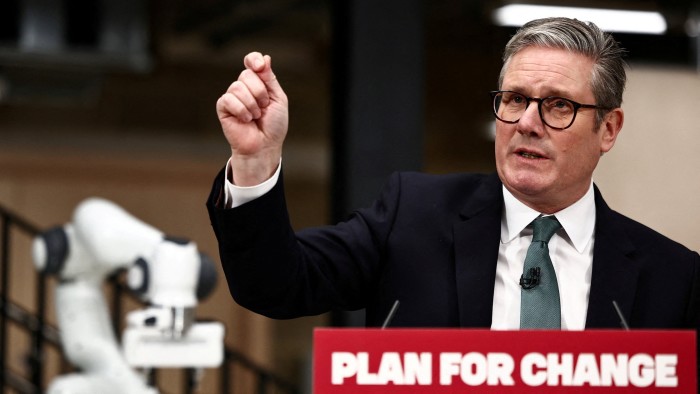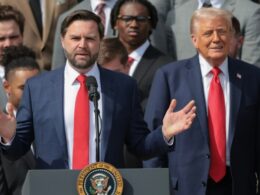This article is an on-site version of our Inside Politics newsletter. Subscribers can sign up here to get the newsletter delivered every weekday. If you’re not a subscriber, you can still receive the newsletter free for 30 days
Good morning. Last week provided a perfect snapshot of the bind the Labour government finds itself in. The UK has been hit by Donald Trump’s blanket tariffs which threaten to drive up the price of goods and dent Keir Starmer’s efforts to grow the economy.
Economists think that if the tariffs remain at the rate Trump has currently set, any resulting slowdown in growth could eat into the fiscal headroom Rachel Reeves afforded herself by slashing welfare spending and cutting departmental budgets last month.
Starmer has responded by attempting to drip feed announcements that speak to the promise of future economic growth — last week, this included a loosening of sales requirements for electric vehicles and later an announcement of a major theme park to be built by US media group Universal in Bedford.
As Starmer and his team remind us ad nauseam, growth is their number one mission.
Inside Politics is edited by Georgina Quach. Follow Anna and Georgina on Bluesky. Read the previous edition of the newsletter here. Please send gossip, thoughts and feedback to insidepolitics@ft.com
Pitfalls of the laser focus on growth
The past five years have demonstrated pretty unequivocally that global shocks can have a huge impact on economic growth in a way that is very difficult for governments to prepare for. The Covid-19 pandemic and the war in Ukraine have led to sharp rises in inflation and significantly dampened economic growth.
And unforeseen catastrophes aside, even if the UK were to achieve a significant increase in economic growth over the next few years (before Trump’s tariff announcements, the Office for Budget Responsibility predicted 1.8 per cent growth in 2029), growth in itself does not translate into happy voters and electoral success.
As the Democrats headed into the US election they wielded economic data that peer countries across the western world could only dream of. During Joe Biden’s presidency, the unemployment rate had fallen from 6.4 per cent to 4.1 per cent, GDP growth was 2.8 per cent in 2024 — the highest in the G7 (notably this is Starmer’s aim) — and real median wages had increased. And yet numerous commentators have stated that Biden lost the election to Trump on the economy.
My colleague Tej Parikh has done some great reporting that explains some of the reasons large swaths of the American public felt so much worse off at the end of Biden’s presidency than they did at the start.
One important point is that, even though US inflation had fallen from a high of 9.1 per cent in 2022, the cost of essential goods increased at a much higher rate than discretionary goods — meaning that lower-income households felt a higher inflation burden, due to spending more of their income on things like food. And even though inflation had come down from extraordinary highs, the cumulative effect of rising prices year on year was still being experienced by people across the country.
And while low-wage workers saw the highest rate of wage growth in the first couple of years of Biden’s presidency, that tapered off and they had the lowest by the end. Child poverty also increased slightly during Biden’s presidency.
Growth was not evenly distributed, partly because it was boosted by a soaring equity market, particularly in tech stocks, which saw the spoils disproportionately parsed out to shareholders through share buybacks and dividends.
I have spoken to several Labour MPs this week who fear that the message on growth is not resonating with their constituents. The fact is that the term means very little to most people.
The worry for many Labour MPs is that when the government talks in abstractions, more concrete messaging (that tends to centre around a clear enemy) — like Farage’s promise to deport all irregular migrants or get rid of fat-cat salaries at local councils, pack a much stronger punch.
Starmer might be wise to think not just about driving home the message that his government will pursue growth, but drill down on the measurable things that growth is actually supposed to achieve: the end rather than the means.
So what should economic growth facilitate? Lower unemployment, more affordable goods and services, reduced poverty, more money for the government to spend on public services such as healthcare and education, to name a few.
Starmer’s government has so far resisted calls to remove the two-child benefit cap and has instigated welfare reforms that the Department for Work and Pensions estimates will lead 250,000 more people, including 50,000 children, into relative poverty by the end of the decade.
Rental prices are still incredibly high (annual rental market inflation reached a peak of 12.2 per cent in the summer of 2022), and energy prices remain some of the highest in Europe, largely because of the UK’s reliance on gas.
A commitment to bring these down by a specific date would neutralise the threat posed by populists, who argue soaring energy prices are caused by the government’s fixation on net zero and sky high rents are caused by a flood of migrants to Britain.
It would also focus minds in Whitehall on things the public might actually feel in their pockets by the time they are asked to elect their next government.
Donald Trump’s policy agenda has sent shockwaves across the globe. Got questions about what exactly it means for trade, economics and geopolitics? Join FT experts including Alan Beattie, author of the Trade Secrets newsletter, for a reader Q&A that goes live tomorrow at 3pm. You can drop your questions in the comments of this article.
Now try this
I am currently reading Anna Karenina, having never read any Tolstoy before, and am finding it impossible to put down.
I am thoroughly enjoying being transported to the elite and scandalous corridors of Moscow society life where people “don’t understand what is noble and what is ignorant, though they always talk about it”.
Top stories today
-
What an ore-deal | Critical raw materials will be delivered today for use in British Steel’s blast furnaces, as the immediate crisis engulfing the company begins to ease. Ministers had been worried the furnaces would be shut down after talks over a taxpayer support package with Jingye Group, the company’s Chinese parent, broke down last week.
-
A year of ‘delivery’ | Scottish first minister John Swinney will bring forward his legislative programme by four months to May 6, to deal with the increased likelihood of recession following Donald Trump’s tariff turmoil.
-
Refuse to back down | Bin workers in Birmingham have rejected a deal to end industrial action, extending the month-long strike that has led to rubbish piling up across the UK’s second city.
-
Betting scandal | Former Conservative MP Craig Williams has been charged with betting offences by the Gambling Commission after allegedly placing a wager on the date of last year’s general election.
Source link









